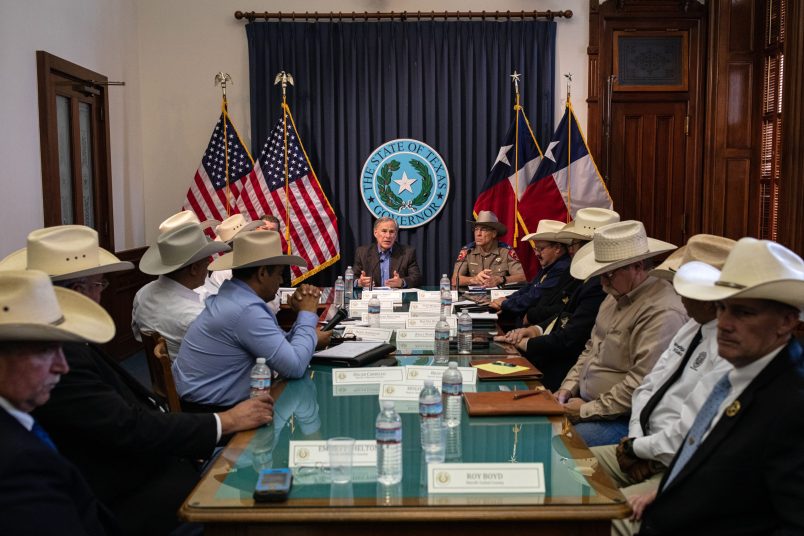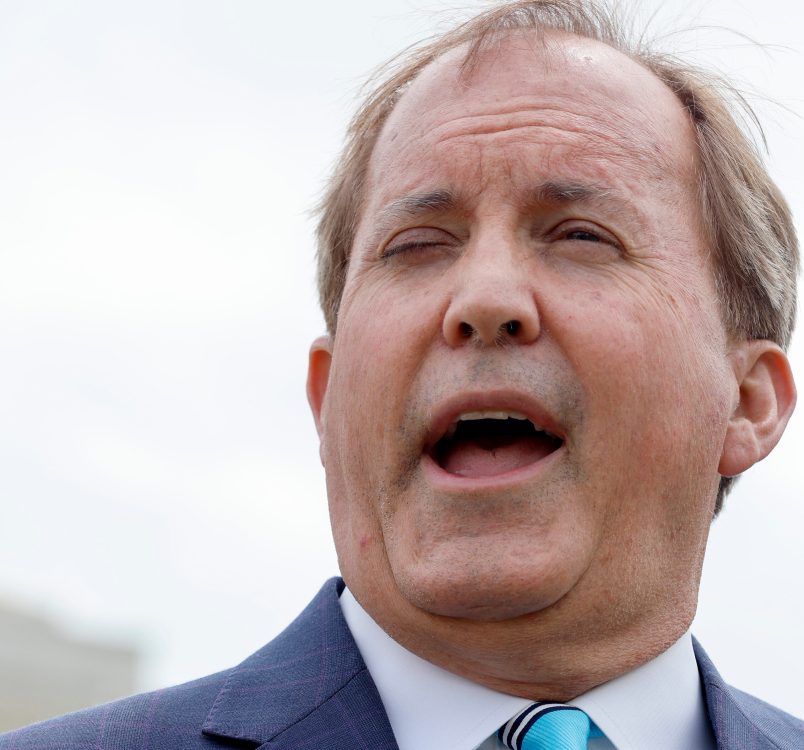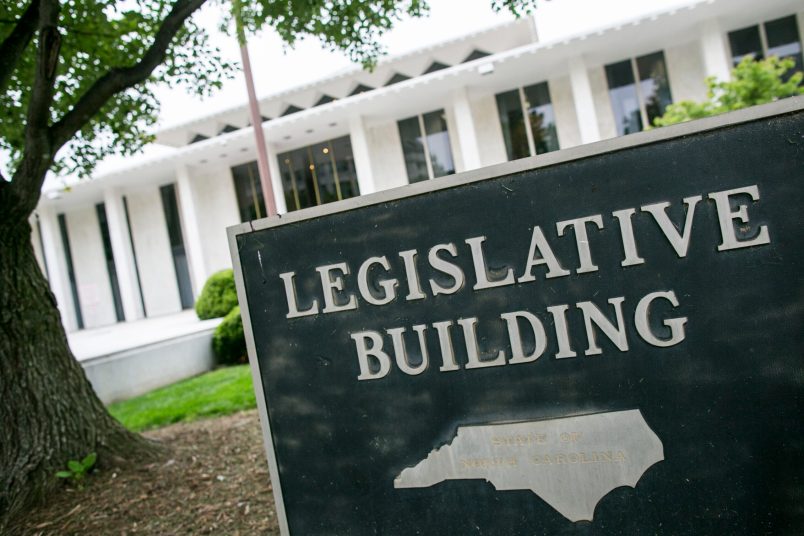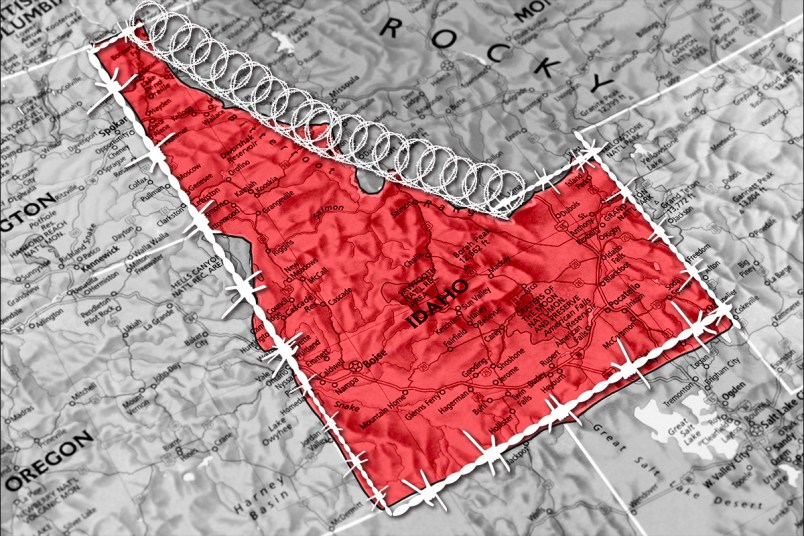There are two weeks left in the Texas legislature’s biennial legislative session, and a raft of hard-right bills stand to get passed to Gov. Greg Abbott’s (R) desk.
The measures range from attempts to strip liberal towns and cities of the ability to regulate businesses to efforts to crack down on LGBTQ rights.
At the center of it all are Abbott and Lt. Gov. Dan Patrick (R), who are marshaling lawmakers into a marathon final two weeks.
Below are five points on the most extreme and consequential areas of legislation under consideration by state lawmakers.
Voting Rights
It’s the granddaddy of regressive efforts, the source from which all other reaction flows: attempts to restrict the franchise and keep the electorate conservative as Texas’ demographics shift.
The state Senate has already voted to make voting illegally a felony offense. That could encompass prosecutions of people who cast a provisional ballot out of uncertainty that their absentee vote had been counted. The state is also considering creating so-called “election marshals,” a group of law enforcement officers dedicated to investigating voter fraud as elections themselves occur.
The law recalls the 2016 case of Crystal Mason, a black woman from Dallas who received a five year prison term for casting a ballot as a convicted felon. Mason was unaware that she was not permitted to vote.
Yet another measure, passed by state Senators, would allow the Texas secretary of state to rerun elections in the Democratic stronghold of Harris County, home to Houston. The criteria there would allow the official to redo the election if they find “good cause” establishing that serviceable ballots ran out at at least 2 percent of voting precincts during polling hours. The measure only applies to counties with populations larger than 2.7 million people — Harris county is the only one to make the cut.
They come amid another effort to reorganize elections in the state which has already been approved by the Senate, and is awaiting a vote in the state House.
That proposal would see the state end its policy of county-wide voting, by which voters in a given county can show up at any precinct to cast their ballots. Under the new proposal, they would have to appear at a set precinct. The move will make it harder to vote, with Republicans citing nonexistent cases to argue that it will prevent people from voting twice.
School vouchers
Football to the rescue.
One of the most interesting political stories has been the buzzsaw of local activism that Abbott and the legislature have run into as they attempt to expand the state’s school voucher program.
Under the proposal, families opting out of the public school system would get $8,000 in taxpayer dollars to spend on private, religious, or home schooling. The state Senate has already passed that, though it’s struggling in the House.
The state’s famously popular high school athletics departments — football most notably among them — have mobilized against the proposal, recognizing that it could lead to a drop in attendance, and a drop in funding for public education. It’s led to groups of coaches who otherwise vote Republican but oppose the measure.
As a result, the bill has stalled out in the House after passage in the Senate. Lawmakers are considering limiting the proposal to smaller groups of students, while Abbott threatened this week to veto a weaker proposal under consideration in the House and to call lawmakers back into session after biennial ends.
LGBTQ Rights
Like other red states, Texas lawmakers are moving to put trans issues at the front of their agenda in a bid to restrict options for those with gender dysphoria.
The Texas Senate is poised to pass a law banning people under 18 from being able to access puberty blockers and hormone therapy.
Lt. Gov. Patrick, a MAGA acolyte, has trumpeted the measure.
And on the legislature floor, one Rep. Tom Oliverson (R) channelled the exact same arguments around homosexuality that were common 20 years go. Oliverson suggested that instead of allowing people to decide their own course of treatment, trans issues should be treated as a mental health concern.
“In contrast to experimental medicine and surgery, professional counseling and psychotherapy is a proven alternative that helps children overcome gender dysphoria,” he said.
Also, one provision of the state’s school voucher push essentially mimics Florida’s “Don’t Say Gay” law, prohibiting public schools from educating students about gender identity and issues around sexual orientation. Another would ban transgender athletes from joining certain college sports teams.
Local control
Pesky liberal towns and cities continue to dot the Texas landscape.
Austin, Houston, Dallas, El Paso, and other cities lean heavily blue and implement various progressive policies at the local level. For GOP lawmakers, this is a problem that must be solved.
The Texas Senate voted this week to approve a bill that would strip cities in the state of the ability to enact certain worker protections, and to regulate environmental conditions, predatory lending, and some sporting events.
The substance of what localities will no longer be able to do if this bill is passed matters, but so does the sheer performance of it.
But if the list of policies that are affected strike you as mostly business-related, and not necessarily the kind of culture war fodder that often comes up in state legislatures, then you’re on to something.
The National Federation of Independent Businesses, a pro-business lobby, issued a statement lauding the measure.
“For more than five years, as cities stepped outside their jurisdiction, the pandemic pumped the brakes on our economy, and uncertainty plagued the business environment, our small business owners have done their best to keep their doors open, take care of their employees, and serve their customers,” NFIB state director Annie Spilman said in a statement.
Immigration
Lawmakers are trying to accomplish two things on the border: codify Gov. Abbott’s massive Operation Lone Star, an effort to use state law enforcement to arrest migrants on trespassing violations. The vast majority of those arrested are released, but having criminal record means that the Texas policy has made these migrants more likely to be deported by the feds. Operation Lone Star is also building a few miles of Trump’s border wall, a particularly expensive part of the show of force.
Texas legislators are pushing through legislation which would establish regular funding channels for the effort, and which would create a state Border Protection Unit, empowered to “repel” and “return” migrants across the border to Mexico.
That goes to the second aim of the session’s immigration lawmaking: trying to get a test case before the Supreme Court which might upend national immigration law, granting Texas the authority to enforce the border itself. While the Border Protection Unit bill remains under consideration by the Senate after passage in the House, Texas state Senators have already passed a measure criminalizing undocumented border crossings at the state level.





